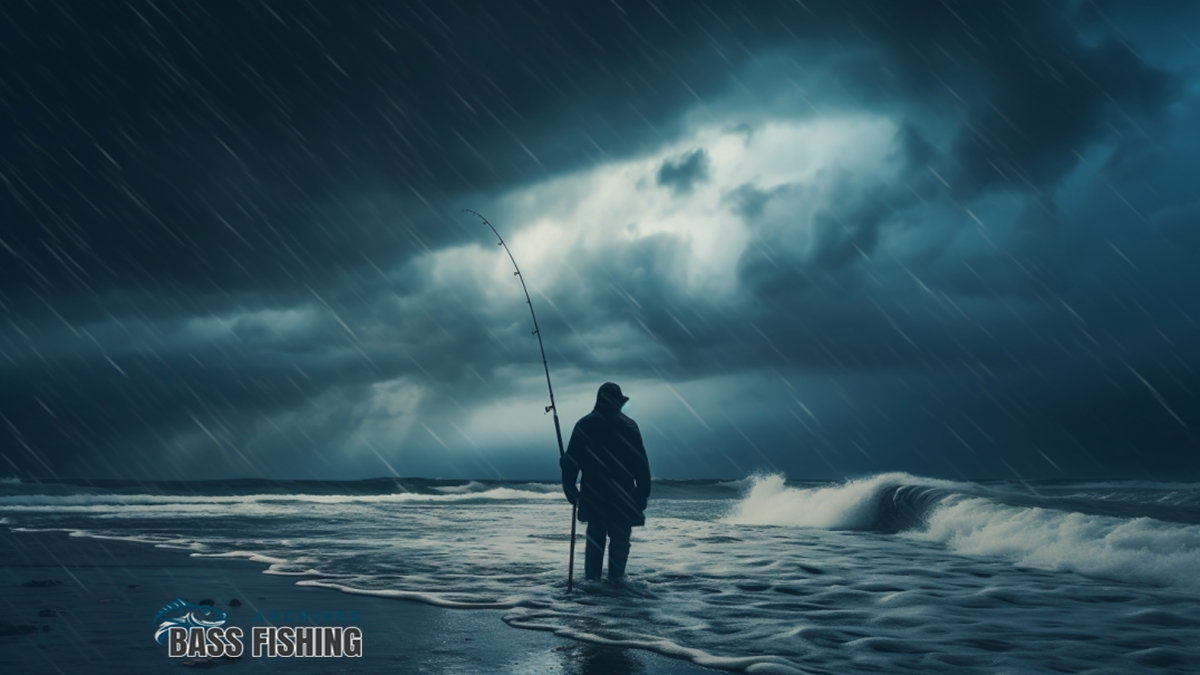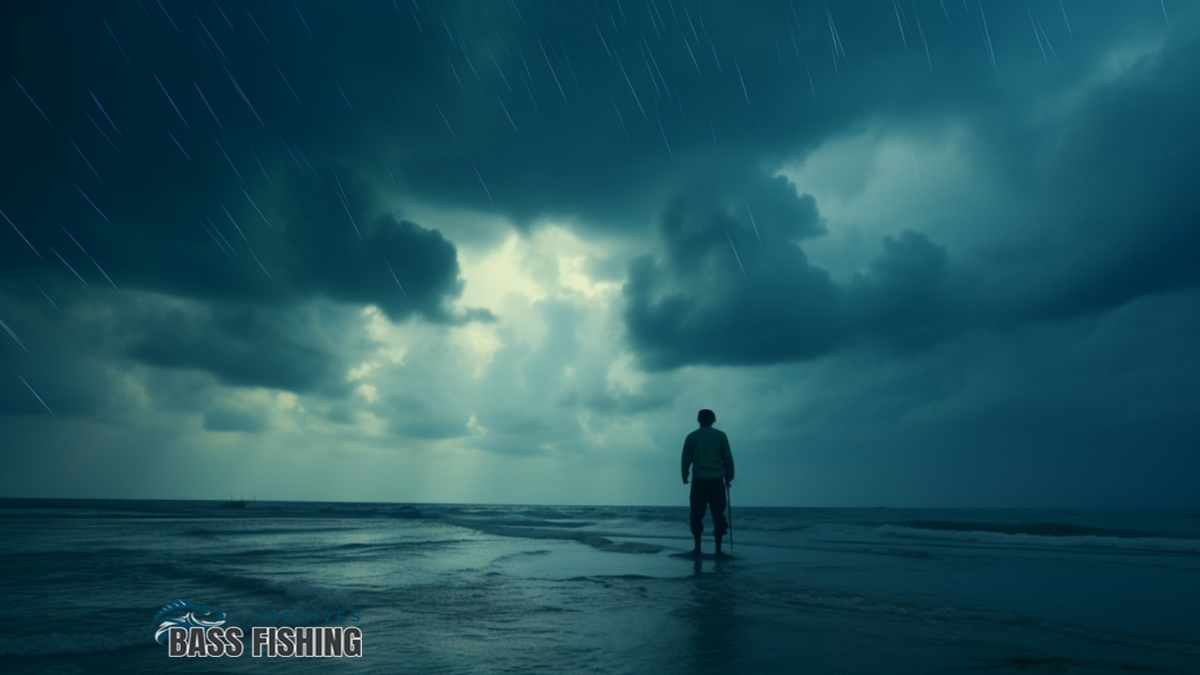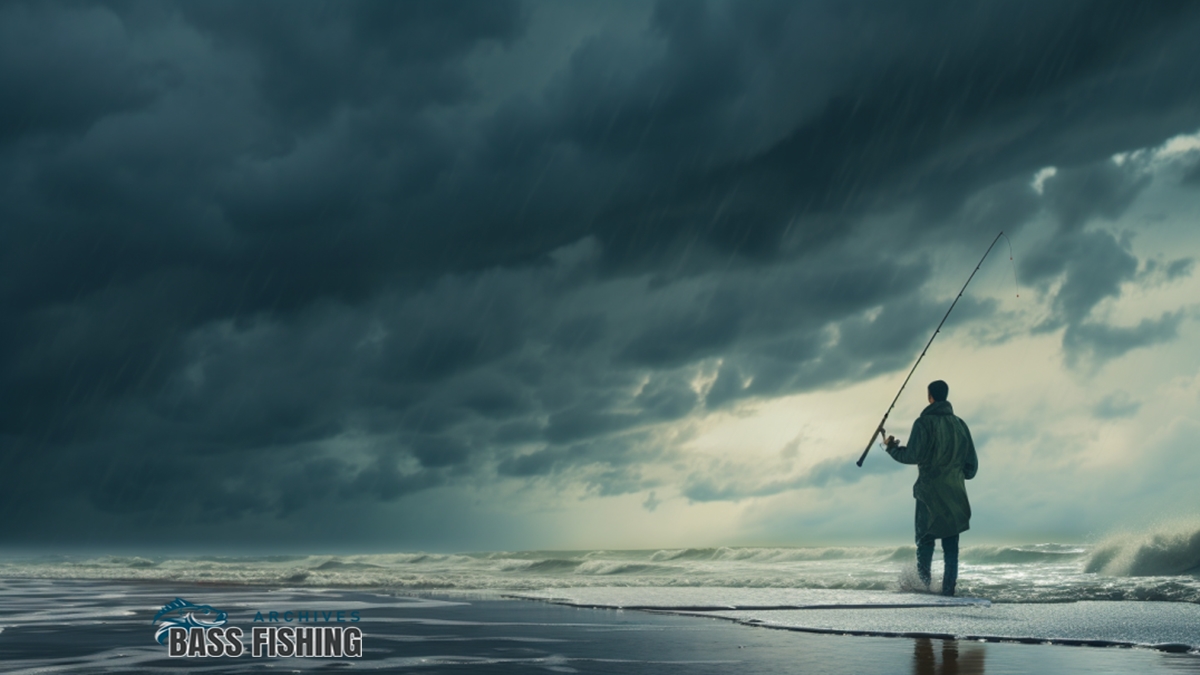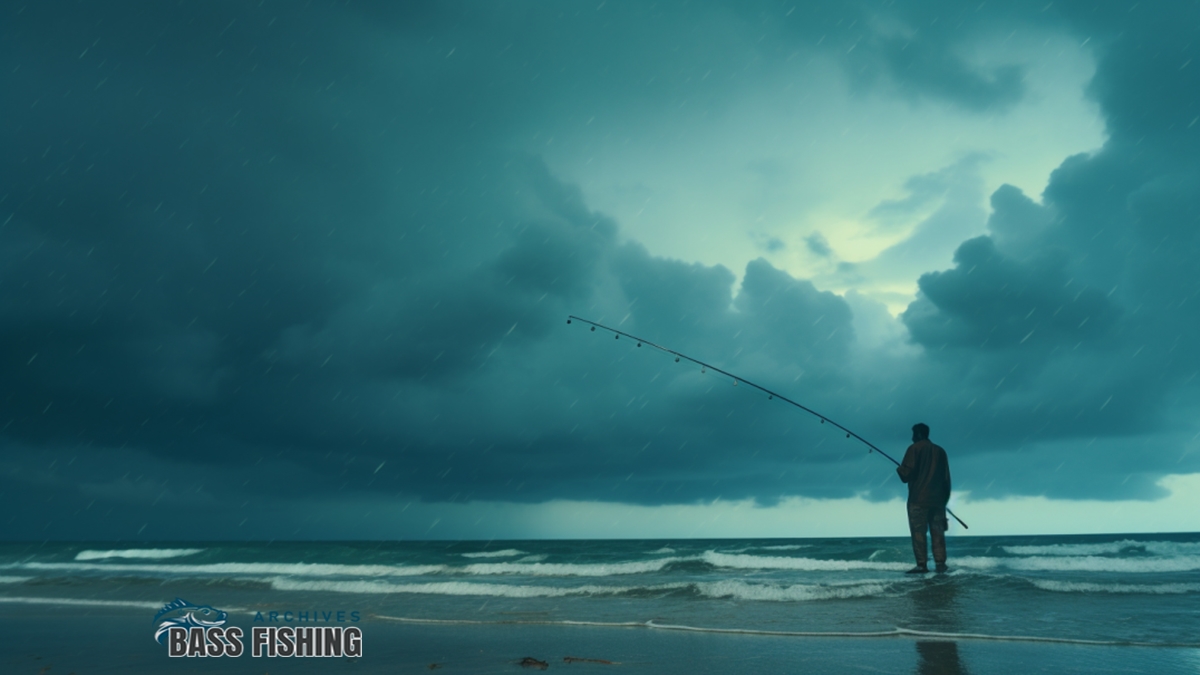Have you ever tried surf fishing in the rain? Can you reel in a big one amidst the drizzle or downpour? This guide will explore the enticing world of surf fishing under the heavens’ showers. We dive into the reasons why surf fishing in the wet rain is not only feasible but can also be highly rewarding.

Whether you’re comparing surf fishing before and after the rain or curious about the interplay between visibility and precipitation, we’ve got you covered. Discover how severe storms impact fish populations and arm yourself with top-notch tips to make your rainy surf fishing adventure successful.
So, rain or shine, let’s get ready to hook a big one!
Table of Contents
What Is Surf Fishing?

Surf fishing is a widely favored recreational pursuit which entails angling from the shoreline of oceans, bays, and estuaries.. It requires staying close to the crashing waves and casting your line with precision into the waters.
To succeed in surf fishing, one needs skillful planning and execution and an understanding of tide conditions and weather patterns.
Commonly sought-after catches range from striped bass, croaker, spot, red drum, flounder, and bluefish. Surf fishing in the rain is a unique experience requiring special know-how.
Whether you’re a novice or a seasoned angler prepared to embrace a fresh challenge, let us commence our journey!
Read more: What is surf fishing?
Is It Good To Fish In The Rain Saltwater?

Fishing in the rain and salt water can be a great experience! Rain often brings water to the surface, attracting fish and leading to successful catches.
Even though it is harder to spot fish in rainy weather, anglers who know their techniques and take proper precautions can still make the most of their outing.
It is essential to wear suitable clothing, observe the barometric pressure, and try different types of lures to increase your success rate.
With the assistance of these suggestions, one can transform a rainy day into a stimulating fishing opportunity!
Can You Fish In The Rain Saltwater?

Yes, fishing in the rain and saltwater is possible! Rain can be a perfect opportunity to catch large fish drawn towards the coast due to high water levels and murky conditions brought by the rainfall.
To ensure success, anglers need to prepare for their outing with proper clothing and lures and observe the barometric pressure.
Additionally, it is essential to recognize the effects of water movement and tides during a rainstorm. With the proper technique, you can make your rainy-day surf fishing adventure incredibly rewarding!
Reasons Why Is Surf Fishing Good In The Rain
Surf fishing in the rain has its benefits. Here are some reasons why it can be a productive and enjoyable experience:
- Water is moved by rain, which can attract fish to the surface and make them easier to spot.
- The water becomes cloudy due to the rain, providing an ideal habitat for larger fish species.
- The rain draws big fish towards the coast, making them easier to catch.
- Rain often brings a stronger scent of bait and lures, enticing predators into striking.
- Visibility is drastically reduced during rainstorms, allowing anglers to gain an advantage over their target species without worrying about scaring them away.
- The rain can also bring a unique atmosphere and a sense of adventure that is hard to match.
If you seek a thrilling fishing experience, consider engaging in surf fishing even during rainy conditions. No worries, you won’t be let down!
Surf Fishing Before The Rain Vs. Surf Fishing After The Rain
Surf fishing before and after the rain can be vastly different experiences. Let’s take a look at the key differences:
- Before the rain, water is usually more apparent, and visibility is better, which can be advantageous for anglers looking to target specific fish species. After the rain, water levels are often higher, and baitfish are generally more active, which can lead to more successful catches.
- Before the rain, water movement is usually weaker, and tides tend to be lower, making it easier for anglers to spot their target fish. After the rain, currents become more robust due to heavy precipitation and higher tides, so anglers should use caution when casting their lines.
- Before the rain, anglers should use natural baits like squid, sand eels, or mullet to catch their prey. After the rain, artificial lures and flies can be more effective since fish are drawn toward the surface by the changes in water levels.
Overall, it is essential to know both conditions when planning a surf fishing adventure. By employing appropriate preparation and techniques, one can maximize their fishing experience regardless of the time or location selected.
| Aspect | Before The Rain | After The Rain |
|---|---|---|
| Water Visibility | Water is more apparent and visibility is better. | Water levels often rise, potentially reducing visibility. |
| Advantage | Easier to target specific fish species due to better visibility. | Baitfish are more active, leading to potentially more successful catches. |
| Water Movement & Tides | Weaker water movement and lower tides. | Currents are stronger due to heavy precipitation and tides are higher. |
| Safety | Easier to spot target fish due to calmer conditions. | Anglers should be cautious when casting their lines because of stronger currents. |
| Bait Recommendation | Natural baits like squid, sand eels, or mullet are advised. | Artificial lures and flies can be more effective as fish are drawn towards the surface. |
| Overall Advice | Be aware of the conditions and adjust techniques accordingly. | Ensure safety and adapt to the changes in environment for an optimum fishing experience. |
Note: It’s crucial for anglers to be prepared and informed about the conditions when planning a surf fishing adventure. Proper preparation and techniques can maximize the fishing experience regardless of the circumstances.
How Is Surf Fishing Affected By Visibility When It Rains?
Surf fishing in the rain can be affected by visibility in multiple positive and negative ways. Heavy precipitation often reduces visibility in the water, which can be beneficial since predators are less likely to recognize the bait or lure.
However, in situations of reduced visibility, anglers may encounter increased difficulty in detecting their target species. To up your chances of success in these conditions, anglers should consider using scents and lures to lure fish during rainstorms.
Also anglers should keep an eye out for currents and tides since they can impact visibility in the water.
May you like: Best Lures For Surf Fishing
What Impact Do Severe Storms Have On Fish Populations?
Severe storms can significantly impact fish populations due to the changes they bring in water levels, currents, and temperatures. Heavy rain often leads to flooding, displacing or drowning fish poorly adapted to these conditions.
Moreover, the presence of strong winds can result in heightened turbidity within the water, thereby impacting visibility and facilitating predator-prey interactions. Additionally, storms possess the potential to inflict physical harm on habitats and disturb the equilibrium of fish populations through a decrease in oxygen levels. A combination of these factors can impart an adverse influence on fish populations, necessitating angler awareness and consideration when scheduling trips during or after storm occurrences.
Tips For Surf Fishing In The Rain
If you want to make the most out of your surf fishing adventure in the rain, here are some tips that can help:
- Wear the proper clothing: wear waterproof and breathable fabric that will keep you dry and comfortable.
- Observe the barometric pressure: this can give you insight into how active fish may be during a storm.
- Try different types of lures or baits: Try out different colors, sizes, shapes, and scents to see what appeals most to your target species. It’s all about finding what works best!
- Create more noise: fish may be attracted to the sound of your reel or rod, so make sure you use them!
- Notice the tides: Keeping an eye on tides is key to having a successful fishing trip. They have the power to make or break your day out on the water, so it’s crucial to stay tuned.
- Notice the water movement: pay attention to how the water moves to understand better where fish may be located.
- Fish in shallow water areas: many fish species stay closer to the shore in the rain, so focus your efforts there.
- Wear gloves for fishing: rain can make it harder to grip your rod or reel, so gloves can be a great way to ensure a successful outing!
Following these tips can make your time spent surf fishing in the rain more enjoyable and productive.
Read more: Best Reel For Surf Fishing, Reviews 2023
FAQs
Q: Is fishing safe to do in the rain?
A: Yes, fishing in the rain is typically safe as long as you take proper safety precautions. Wear waterproof and breathable clothing, watch the tides, and be mindful of your surroundings. Additionally, only venture into deep water if you are a confident swimmer!
Q: What time would be ideal for surf fishing?
A: The best time for surf fishing depends on the species you target. Certain fish species exhibit peak activity during the early morning or late evening, while others are more inclined to strike in daytime hours. Additionally, monitoring tides and weather conditions is advantageous to effectively plan your fishing excursion.
Q: What time of year is best for surf fishing?
A: Generally speaking, the best time of year for surf fishing varies depending on location. It is typically best to fish in warmer climates during the spring and summer when the water is clearer. On the other hand, colder climates may succeed more during fall and winter when baitfish are more active. Ultimately, conducting thorough research to determine the optimal fishing time for the targeted species is essential.
Q: What weather conditions are best for surf fishing?
A: While every angler has their preferences, clear and calm conditions are generally best for surf fishing. The water should be relatively still so that you can easily spot your target species, and low winds reduce turbidity in the water, which can attract fish more efficiently. Additionally, mild temperatures make spending extended periods outdoors while fishing more comfortable.
Q: Which tide times are best for surf fishing?
A: Generally, incoming and outgoing tides are the most productive for surf fishing. During an incoming tide, fish often move toward the shore, which makes it easier to spot them. On the other hand, during an outgoing tide, baitfish are more likely to be drawn out into deeper waters, which can also attract predators. Ultimately, it is essential to research and determine the best tide times for the species you are targeting.
Q: Why don’t fish bite after rain?
Although answer remains elusive, it is commonly accepted that heavy rainfall and flooding can disrupt the equilibrium of fish populations. Furthermore, turbidity in the water caused by strong winds or fluctuating temperatures may pose challenges for predators in locating their prey. It is imperative for anglers to diligently monitor weather conditions when organizing fishing excursions. Those conditions can have a big impact on how things turn out and how productive the outing is.
Q: Which type of bait is ideal for fishing in the rain?
The choice of bait mainly relies on the specific fish species that you intend to catch. Generally speaking, live bait such as worms or minnows tend to be more attractive during rain due to their scent and movement. However, lures and artificial baits can also be effective if used correctly. Conducting experiments with different types of baits is crucial in order to determine the most effective options for attracting your target species.
Q: What lures are effective in the rain?
A: Generally speaking, spoons and spinners are often the most effective lures in the rain due to their bright colors and flashy movements. Additionally, soft plastic jerk baits can be effective since they more closely resemble baitfish. In order to optimize success, it is crucial to conduct experiments with various lures and determine the most effective ones for your target species.
Read more: What Size Hook For Surf Fishing? Hook Sizing, Type Explained.
Conclusion
Surfing fishing in the rain can be a great way to experience the thrill of catching the big one! However, proper safety precautions and monitoring weather conditions are essential when planning your outing.
Additionally, anglers should experiment with various lures and baits to maximize success.
Following these tips can make your surf fishing adventure more enjoyable and productive! Good luck!